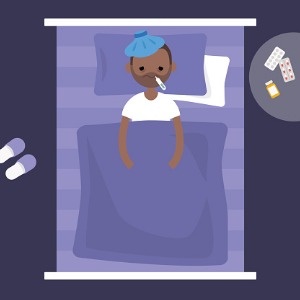
Earlier this year an outbreak of drug-resistant tuberculosis caught Australians unaware. It started when a doctor in Sydney misdiagnosed a student with asthma and lung cancer – before realising it was TB.
Scary stuff indeed, but understandable as TB shares symptoms with other respiratory conditions, namely the flu. The symptoms of both can be similar but one is infinitely more dangerous than the other.
TB is caused by the organism Mycobacterium tuberculosis, which is easily spread when people with active lung disease expel the small airborne TB particles from their lungs into the air through coughing. Other people then breathe in the infectious droplets into their lungs, where the bacteria begin to multiply.
Influenza (flu) is caused by an influenza virus. The virus “sits” in the infected person’s nose and throat and when they speak, sneeze or cough, the virus becomes active – and infectious. It can be left on hands, surfaces, and items like tissues, washcloths and handkerchiefs. You can be infected with flu viruses via the air, or an infected hand or object touching your nose or mouth.
Symptoms in common
- General coughing
- Chest pain
- Difficulty breathing (shortness of breath)
- Weakness and fatigue
- Loss of appetite and weight
- Chills and fevers
- Joint pain
- Diarrhoea
Where they differ
TB is a beast of a disease that’s wreaking havoc across the country and continent. According to the World Health Organization, South Africa has the third highest incidence of any country after India and China. What’s more, the vast majority of South African TB sufferers are in their most economically productive years, according to the Medical Research Council (MRC).
The symptoms are more intense than the flu:
- A cough that starts out dry but later produces sputum (thick liquid from deep inside the lungs) or blood.
- Coughing for longer than a month.
- Rales (additional sounds made to those of normal breathing).
- Excessive sweating, including sweating at night.
- Hearing loss.
- Diarrhoea.
- A persistent lump or lesion.
- Clubbing of fingers or toes; the nails become swollen and feel slightly "pulpy".
Those at risk for TB:
- More than half of all TB patients also have HIV. The latest figure from the South African Department of Health is that 73% of TB patients are HIV positive.
- Have been in close contact with someone who has TB.
- Were born where TB is common.
- Live in an area where overcrowding, poor ventilation, malnutrition, substance abuse, and unemployment are rife.
- Have a condition that weakens the immune system (diabetes, cancer or kidney disease).
- Have already been infected with TB in the last two years.
A weakened immune system is the most important factor in the development of TB after exposure to the organism. Even though research hasn't directly linked TB to stress, it’s suggested that excessive stress weakens the immune system and generally increases one's risk of contracting diseases.
When do I need the doctor?In both conditions, you need medical care. For the flu, you’ll need the injection. For TB, you will take a TB test and then stay on your full course of prescribed medication.
It’s particularly important to take care of TB symptoms as soon as possible, especially if you’re at risk. Successful treatment takes at least six months, and medication must be taken exactly as prescribed. Incomplete treatment or not following a consistent treatment regimen may cause you to develop drug-resistant strains of TB, which may be extremely difficult to cure and can even be fatal.





 Publications
Publications
 Partners
Partners










